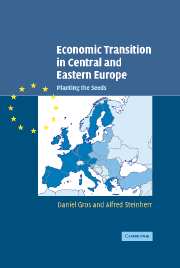Book contents
- Frontmatter
- Contents
- List of figures
- List of boxes
- List of tables
- Acknowledgements
- Introduction
- Part I The rise and decline of communism: an overview
- Part II Transition: 1990–2000
- Part III Extreme cases for reform: scope for disagreements
- Part IV The new Europe from the Atlantic to the Urals
- 9 From transition to integration: joining the EU
- 10 Saving the Balkans
- 11 The outlook
- References
- Index
11 - The outlook
Published online by Cambridge University Press: 05 June 2012
- Frontmatter
- Contents
- List of figures
- List of boxes
- List of tables
- Acknowledgements
- Introduction
- Part I The rise and decline of communism: an overview
- Part II Transition: 1990–2000
- Part III Extreme cases for reform: scope for disagreements
- Part IV The new Europe from the Atlantic to the Urals
- 9 From transition to integration: joining the EU
- 10 Saving the Balkans
- 11 The outlook
- References
- Index
Summary
In this volume we have analysed the economic transformation of the Central and Eastern European countries, their struggle for economic (and indeed political) renaissance, their successes and their failures.
We started with an overview of the communist system, both as a theoretical construct (‘just an idea’ of Karl Marx) and the performance of the Soviet Union, once a serious challenger to the United States in superpower rivalry. We found that socialism was successful in producing certain basic goods that can be measured in physical units: tonnes of steel, kilowatt-hours of electricity, gold medals at Olympic games, etc. But since this system never grasped the importance of opportunity cost it turned out that a lot of this production was economically useless (or worse). The industries most cherished by social planners were usually the ones that had the greatest adjustment difficulties once market forces were allowed to work and economies were opened to international competition.
The extent to which socialism failed to deliver can best be seen in two real-world examples. Before Poland fell under communism its level of development was comparable to that of Spain. After forty years of communism Poland emerged in 1990 with a GDP almost ten times lower than Spain, which had also endured forty years of dictatorship, but one that left market mechanisms broadly intact. A similar situation can be found in the former Austro-Hungarian empire, where up to the Second World War Austria and Czechoslovakia were at a broadly similar level of development, with Austria slightly worse off because industry was concentrated in Czechoslovakia.
- Type
- Chapter
- Information
- Economic Transition in Central and Eastern EuropePlanting the Seeds, pp. 325 - 337Publisher: Cambridge University PressPrint publication year: 2004



